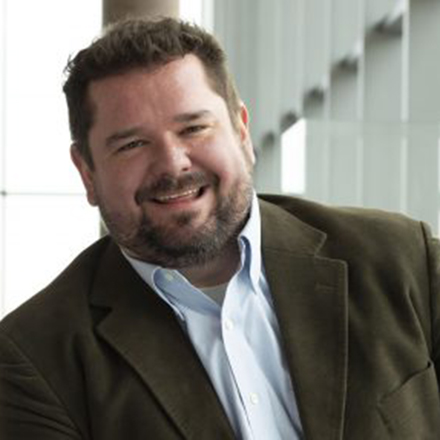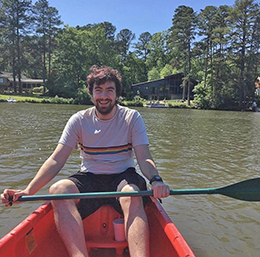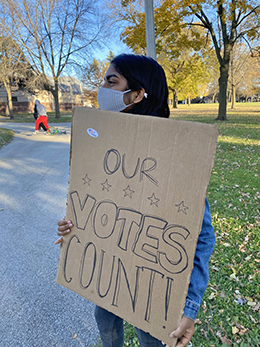Student Conversations
 In December 2020, American Studies Senior Program Administrator Tom Burke talked with recent grad Amos Pomp '20 and current senior Keerti Gopal about the impact of their American Studies major.
In December 2020, American Studies Senior Program Administrator Tom Burke talked with recent grad Amos Pomp '20 and current senior Keerti Gopal about the impact of their American Studies major.
Read on to see how they're adjusting to work and school during the coronavirus pandemic; how they've tapped their research to advance their volunteer and professional work; and some advice for first-year students.
Alumnus Amos Pomp, Class of 2020
Tom Burke: Amos! I’m so happy to reconnect with you! Congratulations again on graduation last spring. How are things? Where are you? What are you up to? Amos Pomp: Thanks Tom! I've actually stayed in Evanston post-grad. I had a part-time job with an outdoor adventure therapy nonprofit that transitioned to full-time, so I'm sticking around for the foreseeable future. My primary job is to lead experiential activities with teens, and we did have some programs this summer/fall, but many of our partners were unable to run programs this year. Instead, we've spent the time on staff training (canoeing, sailing, JEDI, therapeutic techniques, etc.), equipment maintenance, and various administrative tasks. Sometimes things are frustrating and overwhelming, other times I feel productive and sufficiently social, and a lot of the time I feel bored and understimulated.
Amos Pomp: Thanks Tom! I've actually stayed in Evanston post-grad. I had a part-time job with an outdoor adventure therapy nonprofit that transitioned to full-time, so I'm sticking around for the foreseeable future. My primary job is to lead experiential activities with teens, and we did have some programs this summer/fall, but many of our partners were unable to run programs this year. Instead, we've spent the time on staff training (canoeing, sailing, JEDI, therapeutic techniques, etc.), equipment maintenance, and various administrative tasks. Sometimes things are frustrating and overwhelming, other times I feel productive and sufficiently social, and a lot of the time I feel bored and understimulated.
Tom: What about some of your fellow graduates, how do you think everyone is doing in these strange times? Have people landed on their feet, are people struggling, or, maybe they are slowly finding their footing?
Amos: Some of my peers are in grad school; a few others moved to new cities and started jobs. Most that I know, though, moved home at the start of the pandemic or after graduation and have either found or are still looking for jobs—temporary, remote, but potentially long-term, or wherever will hire them. I suppose to answer your question, I think everyone is, in one way or another, slowly finding their footing. Adjusting to post-grad life, without the structured schedule of the academic year, is weird enough before you pile on the social justice movement, the 2020 elections, the pandemic, and the fact that the job search has changed dramatically, as have the routines of those who already had jobs, like me.
Tom: Could you talk a little bit about your senior project?
Amos: My senior project was about the diversity and inclusion movement in the U.S. outdoor industry. I dug into the history of "wilderness," outdoor recreation and adventure, and social norms and ideas surrounding who the outdoors "belongs to" and who "belongs" in the outdoors. Not only are people retelling erased histories of the relationships of Black, indigenous, queer, trans, and disabled people to the outdoors, but many people and organizations have created outdoor affinity groups and inclusive outdoor programming to practically and actively "diversify" the outdoors. I also conducted ethnographic interviews and observations for two months at an outdoor adventure programming nonprofit with a mission of inclusion and analyzed the relationships of administrators to the inclusive mission vs. the lived experiences of ground-level staff members within the organization and with clients.
Tom: If applicable, can you please also talk about how the research and work you did on your senior project might translate into your current or future life?
Amos: First off, I think my thesis was a big factor in my getting hired last October for my current position. I wanted an outdoor programming job with a focus on equity and inclusion, and my thesis experience helped me land a position in exactly that field. My thesis also prepared me with plenty of language and references to use in discussions this past summer about how to make our organization even more focused on racial justice and inclusive programming. In a more nebulous sense, my project has provided me with a network (for rec letters, friendships, potential job opportunities, potential roommates in new cities) and skills that I might use one day if I go to grad school. Re-reading my thesis every now and then also gives me a bit of a confidence boost, like, "Hey, I did that!" And I've read quite a few of my peers' theses over the months as well, which has been a blast!
Senior Keerti Gopal, Class of 2021
Tom Burke: Hi, Keerti! I’m so happy to have this conversation with you. I knew you when you first arrived at Northwestern, you may or may not recall, and I’m always so proud to see all that graduating seniors have accomplished during their four years at Northwestern. Could you please give us a quick rundown of your majors and minors (if any), and also the organizations and groups you belong to? Keerti Gopal: Hi Tom! I absolutely remember meeting you during Kaplan pre-orientation, I have such great memories from that program! I'm currently an American Studies major and Creative Writing minor, and I'm involved with Peer Health Exchange, THUNK A Cappella, Nine Lives Podcast, and the Contemporary Thought Speaker Series. I also work at the Writing Place and the Institute for Policy Research.
Keerti Gopal: Hi Tom! I absolutely remember meeting you during Kaplan pre-orientation, I have such great memories from that program! I'm currently an American Studies major and Creative Writing minor, and I'm involved with Peer Health Exchange, THUNK A Cappella, Nine Lives Podcast, and the Contemporary Thought Speaker Series. I also work at the Writing Place and the Institute for Policy Research.
Tom: And as for your American Studies major, can you please tell me about your senior project, and also a bit of your approach to choosing your coursework? And maybe comment on whether you feel like you were a good fit for the way American Studies majors choose the courses that will fulfill their major?
Keerti: I love the way American Studies majors get to choose courses from different departments and craft their own concentration—it's the biggest thing that drew me to the program in the first place! At first, I honestly just picked the courses that sounded the most exciting to me, but as I went on, I started to notice some patterns, and, ultimately, I honed my focus on social movements and social change, which brought me to my senior project. Two summers ago, through an Undergrad Research Grant, I got involved with the Sunrise Movement, which is a national youth-led climate justice network fighting for a Green New Deal. Sunrise has a really robust digital presence—they're super active on Instagram, TikTok, Twitter—so for my senior project I'm looking at how the online and social media tactics used by the Sunrise Movement have influenced youth politicization and the public profile of the Green New Deal, to study the role that digital organizing can play in new social movements.
Tom: That is so interesting, Keerti, thank you for sharing about that. Switching gears a little, I’d like to ask you about this past fall, during Covid—can you give us an idea of how school has been for you? It’s obviously a challenging time, so I want to encourage you to be candid here.
Keerti: I was a part-time student this quarter, taking two classes so I could spend more time working with the Sunrise Movement on the election and so I could continue an internship I'd started with Sara Gideon's Maine senate campaign over the summer. I think in a lot of ways I felt much more detached from school than usual, but for me this quarter was defined by the election and by the conversations and activism that have been happening on campus. It has been such a scary year in so many ways, but I've seen a lot of people making a serious effort to get involved, whether through phone banking to get out the vote or attending protests against racism and police brutality, and it's been really heartening to see people mobilize like that. And I'm especially proud of my peers who've been leading the calls for abolition at Northwestern, pushing the administration to address racism and reimagine what safety on campus can and should look like. In terms of the pandemic, this year has been hard on everyone, but I've been really lucky to be safe and healthy and surrounded by great friends!
Tom: I’m so impressed by your attitude, and it is so encouraging to hear stories about getting involved. Good for you, and I thank you! Now, here’s a question that I sort of love and hate asking graduating seniors: Do you know what your plans are post-graduation? Or, if not, maybe you have an idea of where you’d like to live, and why?
Keerti: I currently have no plans for post-graduation! I think ideally at some point I'd love to work at the intersection of climate justice and storytelling, and I'm really interested in advocacy/political narrative work, but post-graduation I'm just looking for a job that feels like it will make a positive impact and help me learn. In terms of location, I'd love to live somewhere near mountains. That's about all I've got right now!
Tom: I think you’ve got a really good take on things, Keerti, and I’m sure that will continue to serve you well. This is such a wild time in the world right now. If you’re patient and keep your eyes open, I have no doubt that opportunities will emerge for you, and I have no doubt you’ll conquer anything and everything that comes at you. Wishing you the best of luck! And now, a final question: what advice might you be willing to share with first-year students about college? And, any particular advice for first-years who are currently having a remote college experience?
Keerti: It's not incredibly original, but I think my advice for first-years would be to trust your gut and do what excites you. As much as you can, don't worry about requirements or majors or your resume too much yet, just take the classes that you find most interesting, get involved with things you care about, and trust yourself to know what feels right. For first-years who are starting out remotely, I seriously feel for you—starting college isn't easy in the best of times, and this is far from that. I guess my advice would be to remember that everyone's in this boat together, and that it won't always be like this—and be kind to yourself because virtual life is hard! Also, go to virtual office hours and meet your professors! I've had so many nice zoom calls with professors since the pandemic began, and it really has made the whole virtual school thing feel much less bleak.
